Hey all,
I own a d700 and 16-35vr f4, im trying to get into night photography.. Mostly milky way shots and desert night sky.
I try to use the 16-35 but f4 doesn't get me the results i want, considering d700 is a little grainy above 3200 iso, i need a faster lens just for night shots use, i prefer wide.
At the time i got the 16-35, i didn't had the budget for a 14-24 2.8, also i use the polarizer a lot, thats why i choose the f4 lens.
My budget is low. I could buy a new Rokinon 14mm 2.8 (and have spare $) or used Nikon 16mm 2.8 fisheye.
Could you guys recommend a lens for that task, i could go as high as 800$, prime or zoom doesn't matter, just the final result. Used is ok as well.
Need help guys
Many thanks in advance.
Tom.
I own a d700 and 16-35vr f4, im trying to get into night photography.. Mostly milky way shots and desert night sky.
I try to use the 16-35 but f4 doesn't get me the results i want, considering d700 is a little grainy above 3200 iso, i need a faster lens just for night shots use, i prefer wide.
At the time i got the 16-35, i didn't had the budget for a 14-24 2.8, also i use the polarizer a lot, thats why i choose the f4 lens.
My budget is low. I could buy a new Rokinon 14mm 2.8 (and have spare $) or used Nikon 16mm 2.8 fisheye.
Could you guys recommend a lens for that task, i could go as high as 800$, prime or zoom doesn't matter, just the final result. Used is ok as well.
Need help guys
Many thanks in advance.
Tom.


